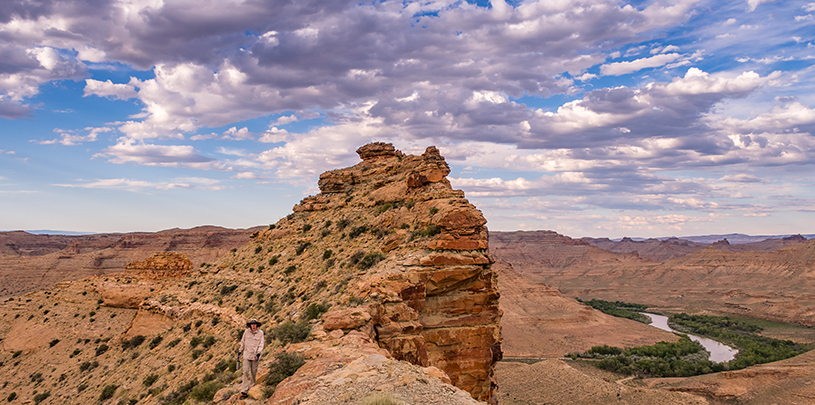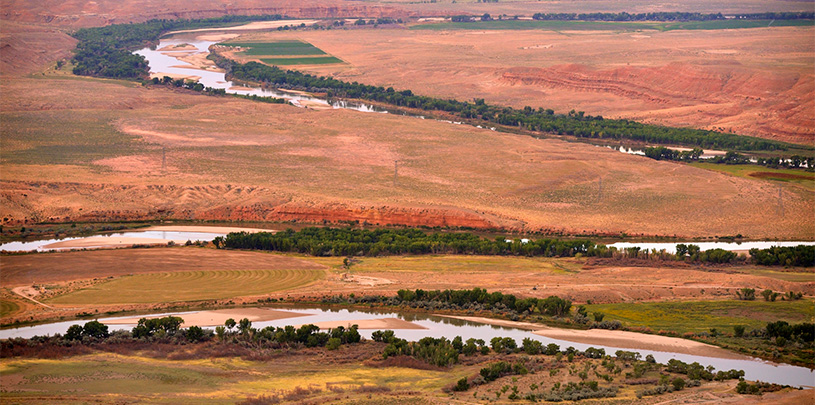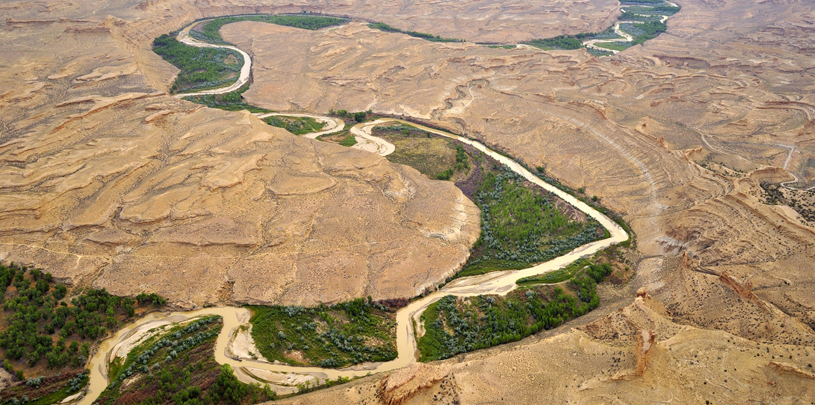
For about a decade, the Grand Canyon Trust has been working to prevent Enefit American Oil Co., an Estonian state-owned oil shale company, from building a massive oil shale facility in northern Utah that would siphon billions of gallons of water from the Green River, above where it flows into the Colorado River.
In Utah, our nation’s second-driest state, Enefit plans to strip mine oil shale rock and process it into synthetic crude oil, one of the most water-hungry, polluting, and energy-intensive fossil fuels on the planet. This has never been done commercially in the United States, and this pipe dream would be calamitous for the environment and for human health.
In 2019, the Trust filed a lawsuit challenging a Bureau of Land Management decision to allow Enefit to build pipelines across federal public lands. While litigating that case, we uncovered something fishy about the water right that is critical to supplying Enefit’s immense water needs. It appears the owner of a nearby coal-fired power plant is helping the oil shale giant take advantage of the law to hold onto a water right for about 3.5 billion gallons of water per year that should have been forfeited and made available to Utah citizens. More on that in a minute. But first, a little background.
An oil shale giant in the Utah desert
Enefit plans to build a 320-acre oil shale processing plant, strip mine up to 9,000 acres of scenic lands, and churn out about 50,000 barrels of synthetic crude oil every day, 365 days a year, for more than 30 years. That’s about 547 million barrels of oil total.
Known as the “South Project,” Enefit’s facility would generate hundreds of millions of tons of often-toxic waste rock that can pollute groundwater and nearby surface water — including rivers home to several endangered fish species.

The well-to-wheel greenhouse gas emissions of synthetic crude made from oil shale are up to 75 percent higher than those from conventional oil. Enefit’s South Project would spew huge amounts of chemicals and ozone precursors — which can cause birth defects and a host of other maladies — into the air. And then there’s the water.
Nearly 10 million gallons of water a day
Oil shale mining and processing require up to about four barrels of water per barrel of oil produced.
To quench this immense thirst, Enefit would use nearly 10 million gallons of water per day from the Green River. Depending on where you live, that’s enough to supply the daily water use of anywhere from about 33,000 households (St. George, Utah) to about 90,000 households (Phoenix, Arizona).
Enefit’s oil-shale-company predecessors got the water right on the Green River back in 1965 for the “beneficial use” of oil shale development. But Enefit has never put the water to beneficial use.
Under Utah law, if a water right holder fails to put its water right to beneficial use within 50 years, that right is forfeited and the water becomes available to the public, a rule designed to prevent would-be water users from indefinitely locking up the public’s water. Still many years away from using the water right to mine and process oil shale at the South Project, Enefit faced losing its water right at the looming 50-year deadline. And that’s where things get interesting.

A water deal to help Enefit strip mine oil shale
Under Utah law, there’s a notable exception to the 50-year deadline. If wholesale electrical cooperatives need the water to produce electricity for the public’s future power needs, the deadline can be extended. So, with the 50-year deadline looming, in 2013, Enefit transferred its extremely valuable water right to Deseret Power, an electrical cooperative that owns the nearby coal-fired Bonanza Power Plant.
Later that year, Deseret Power did what Enefit couldn’t: it filed a request with the Utah Division of Water Rights, the agency in charge, to extend the deadline for the water right, based on its status as an electrical cooperative. Deseret Power swore that it needed all 10 million gallons per day for a new generating unit it allegedly planned to build and put into operation at Bonanza in the next 10 or so years, and another unit within the next 20 or so years. The Division of Water Rights approved the extension beyond 50 years based on Deseret Power’s sworn statements. If not for Deseret Power’s professed need for the water at Bonanza, the water right would have been forfeited and available to the public.
Yet before Deseret Power sought the extension, it signed a contract entitling Enefit to use the entire water right for oil shale development at the South Project for the more-than-30-year life of the facility. Indeed, Enefit has told the Bureau of Land Management that even though the water right is now “held in another corporate entity’s name” — that is, Deseret Power — Enefit has an “exclusive contractual right” to use all the water at the South Project.
It sure looks like Deseret Power struck a deal to help Enefit avoid the forfeiture of its water right at the 50-year deadline, depriving Utah citizens of nearly 3.5 billion gallons of water per year. And these companies are doing so in service of extracting one of the most carbon-intensive fossil fuels on the planet, which will only exacerbate Utah’s climate-change-fueled megadrought, further drying up the Upper Colorado River Basin.

What will Utah regulators do about it?
In November 2021, the Grand Canyon Trust filed a protest with the Utah Division of Water Rights to bring all this to the agency’s attention. We’re arguing that it’s unlawful for Deseret Power to hold onto this water right ostensibly for electricity generation when its deal with Enefit shows that Deseret Power is holding onto the water to help Enefit mine and process oil shale.
Our protest asks the division to forfeit the water right and return the water to the people of Utah. We’re ready to press our case at an upcoming hearing in Salt Lake City.
Do you care about conserving Utah’s water?
Attend the hearing in person
Tuesday, July 19, 2022
10 a.m. – 12:00 p.m.
Division of Water Rights, Department of Natural Resources, Room 214
1594 West North Temple, Salt Lake City, Utah
Listen in virtually
Join the hearing online or by phone ›




